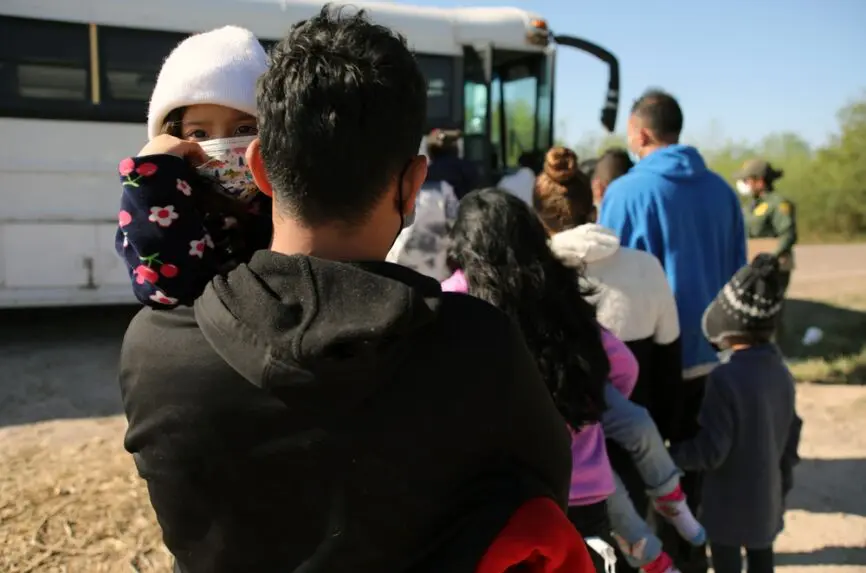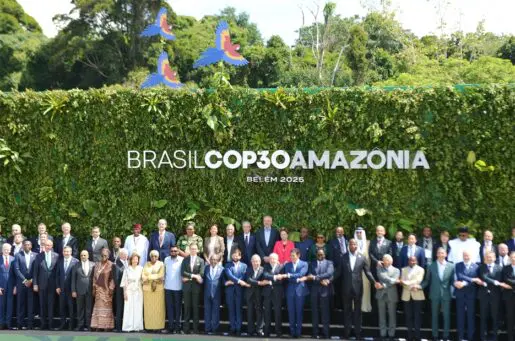Bioethics Forum Essay
Collecting Migrant Children’s DNA: A Troubling, but Predictable, Trend in the U.S.
Recent reports reveal that the U.S. government is systematically collecting DNA from migrant children, some as young as 4 years old, and storing it (perhaps indefinitely) in the FBI’s national criminal database. Though the details and scope of the program are deeply troubling, they are, unfortunately, not surprising.
The practice represents yet another development in the decades-long expansion of the use of genetic information in law enforcement since its first use in a criminal investigation in the mid-1980s. DNA collection was originally restricted to serious offenders, then it became routine for people who were arrested or detained because they were suspected of crimes, and now it includes populations such as migrant children who have not even been suspected of crimes.
DNA has proven invaluable in solving crimes, bringing countless offenders to justice and closure to victims’ families. Officials have defended DNA testing of people crossing the border as a vital tool for verifying migrants’ identities and protecting children by combating human trafficking, as well as arguing that DNA collection helps secure the border by screening for criminals.
But the routine collection of DNA from migrant children for immigration enforcement raises significant legal and ethical concerns. Unlike fingerprints or photos, DNA carries deeply personal information about our health, disease predispositions, and intimate family relationships—data far beyond basic identity. This information, particularly if misused, could have potential long-term implications not just these children, but for their entire extended families.
It is important to note that this is not a new or partisan issue. For decades, administrations of both parties and lawmakers at the state and federal levels have quietly and consistently facilitated the expanded collection and use of DNA by law enforcement. The current border collection policy stems from a 2020 Trump-era change in how the Department of Justice interpreted the DNA Fingerprint Act of 2005—a law originally intended to authorize DNA collection from individuals arrested for serious crimes.
Under the reinterpretation, immigration authorities, particularly Customs and Border Protection, began routinely collecting DNA from migrants in custody, regardless of age, criminal history, or suspicion of criminal wrongdoing. The policy appears poised for further expansion during the current Trump administration, which is seeking a $25 million private contract to increase testing.
More than 100,000 children and teens detained at the border, including those seeking asylum, have been subjected to DNA collection in the form of cheek swabs. The results are uploaded to the FBI’s Combined DNA Index System (CODIS), a national criminal DNA database originally built to track people convicted of serious offenses like violent crimes and sex offenses. Expanding it to store the DNA of migrant children fundamentally blurs the line between civil immigration enforcement and criminal law.
Legally, this widespread collection of DNA from migrant children represents a departure from established norms. In Maryland v. King (2013), the U.S. Supreme Court upheld the collection of DNA from individuals arrested for serious criminal offenses, likening it to the routine procedure of collecting fingerprints. The Court’s reasoning hinged on the context of criminal arrest and the minimal physical intrusion of a cheek swab. However, this logic should not extend to immigration detainees, especially minors.
Children apprehended at the border are not suspects in criminal investigations. They are not charged with crimes, nor do they face judicial proceedings in criminal court. Collecting DNA from children in civil immigration custody—without a warrant, probably cause, or individualized suspicion—raises serious Fourth Amendment concerns and deviates from the rationale articulated in King. Courts have long recognized that children enjoy special constitutional protections, especially where state power intersects with privacy and bodily autonomy.
Ethically, the implications are equally troubling. Although CODIS profiles generally include a limited number of DNA segments used for identification, the government retains the original DNA sample. This means a child’s entire genome is stored indefinitely, making it vulnerable to future use beyond what was originally disclosed or intended.
The risks extend far beyond the individual child. Storing and using DNA in this way opens the door to familial searching or even forensic genealogy, where genetic information is used to identify relatives of individuals already in the database. That means a child’s DNA could be used to implicate parents, siblings, or extended family members, even if those relatives have never interacted with the criminal justice or immigration systems. Moreover, these practices disproportionately affect migrants from Latin America and other marginalized groups, raising the risk of genetic profiling as a tool of systemic discrimination.
The U.S. approach to collecting and storing DNA from migrant children sharply contrasts with practices in other democratic countries, particularly in the European Union. A landmark decision in 2008 by the European Court of Human Rights highlights the differences in approach. S. and Marper v. United Kingdom found that the indefinite retention of DNA profiles from individuals who have not been convicted of a crime—especially children—violated the right to privacy under Article 8 of the European Convention on Human Rights. In the wake of that decision, most European countries adopted policies mandating the deletion of DNA profiles of and samples from such individuals, with additional safeguards for juveniles such as age limits.
That is not to say that the EU is not also wrestling with similar issues in the context of biometric surveillance, particularly surrounding immigration enforcement. The EU’s Eurodac asylum management system, while historically limited to collecting fingerprints from asylum seekers and undocumented migrants over age 14, is currently undergoing significant expansion. Under recent reforms, Eurodac will now include facial images, retain more personal data (such as names and certain documents), and lower the biometric collection age to 6. These moves have drawn strong criticism from human rights and child welfare advocates. Importantly, however, the EU does not collect or store DNA from migrant children for inclusion in criminal databases, though it has found limited use in the context of family reunification.
Given the serious legal and ethical concerns outlined above, the current U.S. system of widespread DNA collection from migrant children demands immediate reform. A growing number of legal scholars, bioethicists, and civil liberties groups—including the authors of the Raiding the Genome report—have called for a moratorium on these practices pending legislative and judicial review. Though the program has already been challenged in the courts, there are a number of immediate steps that policymakers should take regardless of the outcome of those cases:
- First, Congress should enact legislation that prohibits the routine collection of DNA from migrant minors, particularly those under 14 years of age. Any collection should be allowed only in truly exceptional, individualized circumstances. Examples might include a child who is a direct suspect in a serious crime or perhaps a narrow situation of verifying family relationships for reunification—and even then, only with a judge’s approval. Broad collection from civil detainees should not be permitted.
- Second, DNA profiles and samples from children who are not involved in criminal investigations should be promptly expunged from the FBI’s CODIS database.
- Third, there must be greater transparency and oversight, a need highlighted in a 2023 Government Accountability Office report. Agencies involved in the collection and storage of genetic data (such as the Department of Homeland Security, CBP, and ICE) should publicly report key metrics such as the number of children’s profiles added to CODIS, the average age of individuals, the basis for collection, and how long DNA samples are retained. Oversight should not be left to internal review; ideally an interdisciplinary independent body should be tasked with auditing these practices.
Immigration policy is undeniably a complex and challenging issue that requires balancing legitimate national security interests against fundamental human rights. Yet one thing should be clear: Migrant children who are not suspected of crimes should not have their genetic privacy compromised by policies intended for criminal enforcement.
These developments, unfortunately, occur against a much broader backdrop that includes widespread reductions in public health initiatives, research funding, and community support services. Policies that lack appropriate oversight and disproportionately affect children risk compounding existing health inequities and further eroding trust in public institutions. When migrant families fear that access to health care or other essential services could expose them or their families to DNA collection and government surveillance, the ramifications will be felt well beyond the border.
James W. Hazel, PhD, JD, is a senior researcher and lecturer at the Law Centre for Health and Life, Amsterdam Law School, University. LinkedIn jwhazel














As a clinician-in-training and mother, I am deeply disturbed by the quiet normalization of DNA collection from migrant children and its inclusion in forensic databases. Even if presented as an anti-trafficking measure, this practice functionally criminalizes childhood and subjects vulnerable minors to lifelong surveillance risks. DNA is not a neutral identifier—it is an immutable biological signature that links not just the child, but their family network, to potential future law enforcement scrutiny.
From a bioethical standpoint, this policy fails the principles of autonomy, beneficence, and justice. Detained minors cannot meaningfully consent, parents are often absent or disempowered, and there is minimal transparency regarding data retention or future use. The potential for misuse far outweighs any immediate administrative benefit. It is difficult to reconcile this practice with a commitment to child welfare, especially when non invasive, less permanent alternatives like fingerprinting or photo identification could achieve similar goals without compromising genomic privacy.
As a healthcare professional, I see this as an extension of systemic inequities that treat migrant lives as less deserving of ethical consideration. Bioethics demands that we apply the same moral reasoning to all bodies, regardless of citizenship status. The U.S. should not sacrifice minors’ genetic autonomy on the altar of border control.
Concrete ethical steps forward include:
A moratorium on uploading minors’ DNA into CODIS for civil or immigration purposes.
Statutory limits on data retention, with mandated deletion and external oversight.
True informed consent standards requiring guardian or counsel presence.
Independent child-rights and ethics boards reviewing all biometric programs involving minors.
Annual public reporting to ensure transparency and proportionality.
Protecting children should never mean conscripting their genomes into a criminal database. We can ensure safety and accountability without eroding the bioethical foundations of consent, dignity, and justice.
The collection of DNA from migrant children raises enormous legal and bioethical concerns. The use of the DNA Fingerprint Act (2005) to justify the DNA collection of migrant children by the Department of Homeland Security is illegal. The law was originally part of the Violence Against Women Act, intended to justify the collection of DNA from actual criminals. These children are not criminals, nor are they under arrest. The actions of Homeland Security also pose a direct threat to the Fourth Amendment and American civil liberties. The Fourth Amendment outlines the protection against “unreasonable searches and seizures.” Forcing children who cannot consent to DNA collection, I believe, constitutes as unreasonable search and seizure of their persons. The long-term psychological harm to these children should also be considered. There will forever be trauma associated with laboratory specimen collections. I fear that these children will develop a lasting fear of seeking medical attention.
Moreover, the seizure of DNA samples by the Department of Homeland Security raises further bioethical and legal questions. Will these legal statutes be further amended to include the seizure of DNA samples from any person of interest to Homeland Security? Will the current administration extend this statute to all detained U.S. citizens? How does Homeland Security plan to use DNA samples to surveil these children? The use of children’s DNA samples as a means of surveillance sets a dangerous precedent for how DNA may be used. Is that the kind of world we want to live in?
The methods used to store the collected samples raise their own bioethical concerns. How will the long-term storage of DNA samples be managed? How will they be used? American history reveals many examples of DNA sample mismanagement and the harm it causes. The story of Henrietta Lacks should serve as a stark reminder of how institutions may misuse collected DNA samples. Henrietta Lacks did not consent to having her DNA shared with others. The current administration claims to stand for freedom, but how can that be true when it actively violates the basic human rights of children? The future of this issue is unclear. However, there needs to be an immediate moratorium on the collection of DNA samples from migrant children.
References
Glaberson, S. (2025, September 23). The Department of Homeland Security is unlawfully collecting DNA. Lawfare. https://www.lawfaremedia.org/article/the-department-of-homeland-security-is-unlawfully-collecting-dna
U.S. Const. amend. IV
Hi Hazel, I also think this is one issue in bioethics that really strikes me.
The policy practice of collecting DNA from migrant children at the U.S. border recently expanded and now involving tens of thousands of minors (Wired, 2025), blurs the boundaries between civil and criminal procedures and violates deeply held principles of autonomy, justice, and privacy. My concern is heightened especially having come to the U.S. as a migrant to study, I am very much aware of the implications and anxieties that such invasive practices engender.
The collection and indefinite storage of DNA from migrant minors, some as young as four, represents a significant escalation in governmental surveillance (Wired, 2025). Unlike fingerprints, DNA carries unique, permanent, and complex information about family ties, health risks, and ancestry (Georgetown Law Center, 2023). Children detained for civil immigration reasons, not as criminal suspects, are now being treated as potential lifelong entries in criminal databases. Several policy changes, especially those made after reinterpretations of the DNA Fingerprint Act of 2005, have allowed Customs and Border Protection to routinely swab and store children’s DNA, regardless of suspicion or context. This shift is not only troubling but predictable, as it follows a pattern of expanding state surveillance under the guise of security.
What particularly disturbs me is how these practices disproportionately impact Latino and Indigenous groups, amplifying an already fraught history of systemic surveillance. While assigned readings may discuss privacy and consent, what is rarely explored is how DNA governance can reinforce social boundaries, creating a chilling effect on migrants’ willingness to seek help or trust institutions, thereby deepening health and legal disparities (Georgetown Law Center, 2023). As a migrant student, this resonates on a personal level: the policy signals that our bodies and data are always conditionally accepted, never fully protected.
Additionally, few discussions fully acknowledge how DNA, unlike other biometrics, links not just individuals but entire families and communities to legal systems (Wired, 2025). Familial searching and genetic genealogy, while technologically promising for solving crimes, now risk turning innocent children’s biological information into tools for investigation far beyond their immediate circumstances (Georgetown Law Center, 2023). This expansion of possible uses introduces new threats such as future abuses, indefinite surveillance, and the erosion of genetic privacy as a concept.
From the law and bioethics intersection, there’s another concern of the uneven application of constitutional protections. While Maryland v. King (2013) upheld DNA collection for serious criminal offenses, applying this logic to migrant children who have neither been charged nor tried in any criminal court is a grave departure from established understanding. Children enjoy special constitutional protections especially regarding privacy and bodily autonomy, protections that appear almost entirely overlooked in this context.
As someone who arrived in America as a young migrant, I strongly felt the scrutiny and suspicion underlying every official process. But I also came with hope: the belief that education and persistence would allow me to thrive, protected by a rule of law that respected personal boundaries. The news that children, even from only a few years old are swabbed at the border, their DNA stored without meaningful consent or recourse, undermines this hope. It reframes the border from a place of entry to a boundary of constant oversight, and it transforms the migration journey from seeking opportunity to risking lifelong surveillance.
To redress this crisis, the U.S. must adopt a policy approach grounded in dignity and restraint. Congress should enact clear prohibitions on routine DNA collection from migrant minors, restricting such measures to rare and clearly justified circumstances, and only with rigorous judicial oversight and valid, informed consent. When DNA is collected, affected children and families should receive full disclosure about what is being stored, for how long, and for what purposes, with the opportunity to withdraw consent at any time. Genetic material not tied to criminal investigations must be promptly destroyed, rather than indefinitely archived. In tandem, immigration and law enforcement agencies must publicly report the scope of these practices, with oversight by interdisciplinary panels including ethicists, attorneys, scientists, and migrant community representatives. Ultimately, the U.S. ought to shift from a paradigm of biosecurity and control to one prioritizing justice, empathy, and the true protection of the vulnerable (Georgetown Law Center, 2023).
By examining the issue as a migrant, the practice’s message becomes clear: for many, entry into the U.S. now entails surrendering one’s deepest biological identity, without meaningful participation in the conversation about rights or belonging. This experience, rarely discussed, reveals the true bioethical stakes how the ongoing tension between state interests and the basic dignity of those who cross borders in search of a better life.
Thank you for sharing your insight.
References
Georgetown Law Center on Privacy & Technology. (2023). Raiding the genome: How the United States government is abusing genetic surveillance. https://www.law.georgetown.edu/privacy-technology-center/publications/raiding-the-genome/
Wired. (2025, May 29). The US is storing migrant children’s DNA in a criminal database. https://www.wired.com/story/cbp-dna-migrant-children-fbi-codis/